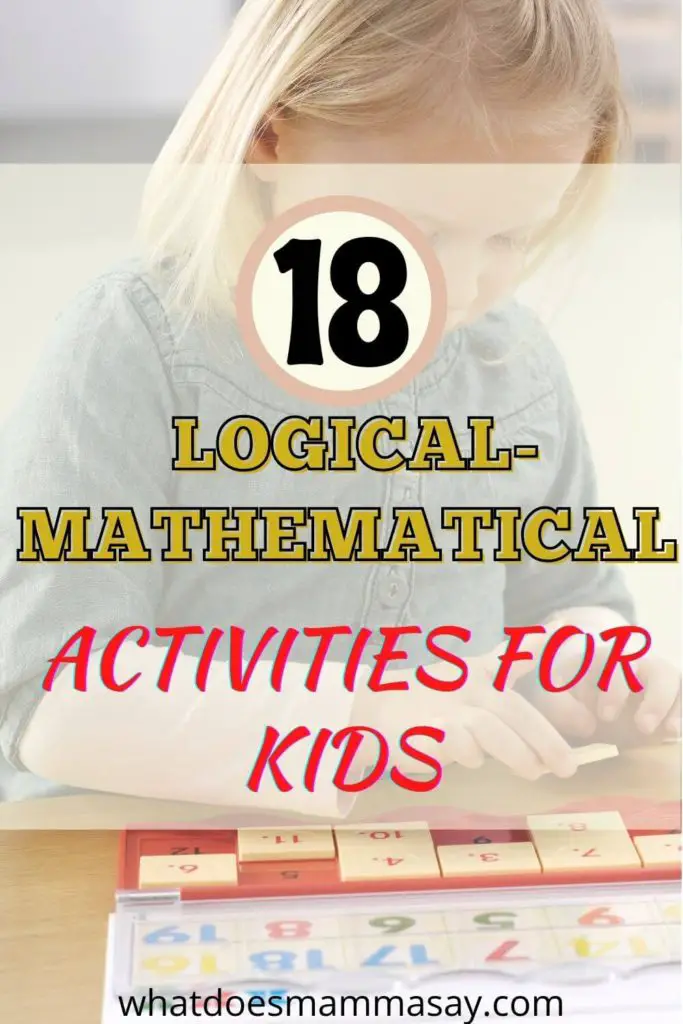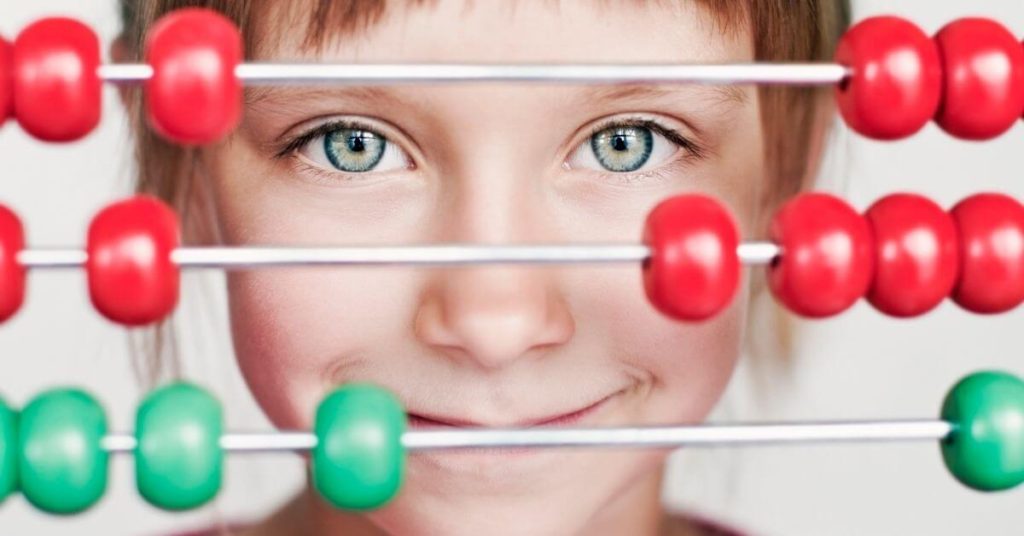One of the eight Intelligences or abilities identified by Howard Gardner in his book Frames of Mind: The Theory of Multiple Intelligences is the Logical Mathematical Intelligence.
In the traditional educational system, the use and development of logical mathematical skill along with the verbal skill are highly emphasized. However, as educators and homeschooling parents, we must be aware that all eight intelligences are equally as important to productively function in society. So, even though this post will primarily discuss the topic of logical mathematical intelligence activities, you will notice that those activities will touch several intelligences as well.
When saying that someone is “maths smart”, what comes to mind? That person is good with numbers, of course. But a logical mathematical intelligence means so much more. Logical mathematical individuals can easily identify and analyze patterns, reason deductively, analyze problems logically, question critically and come to conclusions by integrating the information at hand.
In all classrooms or most families, we will find kids who have a clear preference for the logical mathematical learning style. This post is for those educators or homeschooling parents who want to provide teacher-tested activities for logical mathematical intelligence learners.
As I have written in other articles on the Multiple Intelligences, nobody has just one type of intelligence. We all come to understand the world through a combination of the 8 intelligences identified by Gardner. It is true that people generally have one or two stronger abilities that help them learn easily.
Before we move on to see some great activities for “maths smart” kids, let´s first see some of the characteristics of logical mathematical intelligence.
This post may contain affiliate links and I may earn a small commission when you click on the links at no additional cost to you. As an Amazon Affiliate, I earn from qualifying purchases. You can read my full disclosure here.
What features do people with logical mathematical intelligence have?

There are a few characteristics of logical mathematical intelligence that you can watch out for when trying to determine your students’ or child’s dominant abilities. Some of these characteristics include:
- They have good problem-solving skills
- They absorb information best through reasoning and logical sequencing
- They like being organized
- They have good mathematical skills and are great at solving problems
- They like patterns, classifying and categorizing things
- Enjoy conducting scientific experiments
- Working with abstract ideas is something that they love
- They like investigating problems using logic and facts
- Their decisions are also based on facts and common sense. They will rarely make a decision based on feelings
- They enjoy solving puzzles and riddles
- They are goal-oriented
- When it comes to writing, they prefer the straightforward, bullet points style as opposed to creative writing
- They like clearly defined rules
Now that you know the most important characteristics of logical mathematical intelligence you can start observing your learners and determine how many are “math smart”. According to Sage Journals children as young as 4 or 5 years can exhibit preferences towards a type of intelligence or another. In the case of young kids, you can simply observe them and based on that form an “intelligence profile”. For older children, who can read and write, in addition to observing them, you can give them this test that will help you determine their strengths and weaknesses.
What activities would a logical mathematical learner enjoy?
1. Puzzles and Mysteries
A logical mathematical learner will surely love the challenge of a good puzzle. The good news is that there are so many options out there (free and paid) for both physical and online materials. Here are a few of our recommendations (ages 4-8):
Workbooks and Printable Busy Books:
- Logic Puzzles for Kids Ages 4-8 Workbook
- Perfectly Logical Workbook
- Cars and Trucks Activity Book
- Numbers Busy Book for Preschool

Check out our fantastic Numbers Busy Book. 50 fun pages for kids to practice number recognition, counting and basic mathematical operations.
Games
- Rush Hour Puzzle game
- Mental Blox
- Maze Magnetic Puzzle Game (great for Visual-Spatial ability as well)
- Brain Games-Reusable/Erasable Activity Mats
2. Riddles
Nothing gives the brain a better workout than a good riddle. Not to mention that they are fun especially for a “maths smart” child. If you are looking for some great riddles for young kids, take a look here. What I love about this post is that it also gives hints to the riddles.
3. Board Games
Board games are fantastic fun tools to be used in education. They develop collaboration skills, patience, learning how to win or lose gracefully and depending on the board game, maths and logic skills. Here are a few great board games for young kids that you might want to check out:
- Sum Swamp Board Game
- Frog Math Scale
- Stepping Stones ( great for bodily kinesthetic learners)
- Monopoly Jr.
- Count your Chickens
4. Strategy type games
Kids with logical mathematical intelligence are drawn to strategy games like chess, Tic-Tac-Toe, Connect 4, Dominoes etc.
5. Research Projects
A logical mathematical learner loves organizing information in a logical way, investigating using facts. So why not challenge kids with a fun research project? Simply choose a topic of interest like a certain dinosaur, an insect, the solar system, volcanoes etc. and allow your little one to find out as many things about the topic as possible. Older kids can organize and structure the information on their own, however, for younger kids, you might want to create some worksheets to guide their research. I like the materials from Wifeteachermommy.com.
6. Scientific Experiements

One characteristic of logical mathematical intelligence is curiosity. People with this type of ability like to know how things work and make sense of the world through logic and reasoning.
This is why an activity like doing scientific experiments will be very enjoyable.If you are not sure about what experiments to do with your child, take a look at this cool resource: 10 Free Sites for Kids who Love Science.
7. Coding
We live in the digital age so coding is a valued skill to be learned by kids. Coding helps with problem-solving skills, language and communication, creativity, math skills and more. Kids as young as 2 can be introduced to the coding world through simple pre-coding activities and games. Take a look at these hands-on coding games for kids and this list of coding apps for kids.
8. Conducting a survey
Conducting a survey involves multiple skills like listening, speaking, great organization, categorizing, maths etc.
This is a great activity for a logical mathematical learners, as they get to organize questions into bullet points or in a table, they get to make logical assumptions, adding up the results and using data graphs like pie charts, bars or lines to organize the results.
9. Math Games
It makes sense that logical mathematical kids will enjoy math-related games. The internet is a rich place to find both paid and free games that your child will enjoy and will help him/her practice Math. For example, Math Games is a free website that contains many arcade games, worksheets, Q&A type of games and much more, everything organized in skills or grades.
10. Creating timelines
A good way for a logical mathematical learner to absorb information in a subject like History for example is to create timelines. Organizing the information in a clear, logical way will help the child learn much easier than reading pages of prose.
11. Identifying patterns
Patterns help children find logical order in the world around them. Patterns also provide the opportunity to make predictions because they understand what comes next. Identifying patterns is an important skill to be mastered by young children which involves finding relationships between various elements, algebraic thinking, observing mathematical features and regularities. So, it’s never too early to start introducing pattern activities to your child. Not to mention that when it comes to logical mathematical activities, patterns are very popular.
In addition to the logical mathematical activities mentioned above, I’d like to suggest some additional hands-on activities and games that I play with my little boy and many that I have used in the classroom.
These activities are suitable for kids as young as 3 and as old as, well, it’s safe to say that some adults still enjoy these games, hehe. So be sure to adapt the games according to your child’s age and abilities.
Hands-on Activities for Logical Mathematical Intelligence
1. Guess the animal
This game will allow the child to make logical deductions based on the information received.
One player thinks of an animal and gives the other player(s) clues about it. You can decide on the number of clues. Based on the hints the player(s) have to guess the animal.
For example, “It lives in the ocean”, “It feeds on plankton”, “It is the largest animal on Earth” – the whale.
2. The Connection Game
A fun game to exercise that brain is this simple game. One player says 3 (apparently) random objects. The other player(s) have to find one thing that all the objects have in common. If your child is also a visual learner, then it might help to see the objects, in which case you might want to use realia.
3. Solve Einstein’s Riddle
This is an activity for slightly older kids and will require pen, paper and their (imaginary) detective hats.
The world’s rarest fish has been stolen from the city aquarium. The police dogs followed the scent to a neighbourhood with five identical houses. It is up to you to follow the clues (there is a list of 15 clues, so be prepared) and solve the case.
Watch the video and let’s see if you can use your problem-solving skills, make use of logic, organize information and solve the problem using the facts. Good luck!
4. Build with Lego
I love Lego. Besides being fun it offers so many opportunities to practice skills like fine motor, visual-spatial awareness, communication, creativity, patience, focus and for logical mathematical intelligence Lego is a gold mine.
You can practice mathematical operations, create patterns, practice geometry skills, exercise problem-solving skills etc.
You can very well just dump the pieces of Lego on the floor and allow your child free play, they will practice many of the skills mentioned above on their own or you can direct their play in a certain direction if you are looking to refine certain abilities.
Here are some resources if you are looking for inspiration on how to play with Lego:
5. Differences and Similarities (using Venn diagrams)

A Venn diagram uses overlapping circles to show the differences and similarities between a set of two or more items. Thus, the overlapping portion shows the elements in common while the separate parts of the circles show the elements that set them apart from each other.
Playing with a Venn diagram is a great activity for logical mathematical learners as they get to organize the information logically, classify and categorize items by using facts.
Some suggestions that you can use:
- Dogs vs dolphins
- Bananas vs oranges
- Earth vs Mars
- Crocodile vs alligator
6. The Intruder (Odd one out)
One of the easiest logical mathematical activities that you can do with your child is Odd one out. Simply show the child a set of 4 or 5 objects of which one will the intruder as it has nothing in common with the rest. The child has to identify that object and bring arguments as to why it might be the odd one out. Besides being a good game for kids with logical mathematical learning style, it is also good for verbal-linguistic intelligence.
7. 4 in a row

This is a game for all ages. Playing 4 in a row will push kids to develop a strategy for winning, planning ahead, detecting patterns, problem-solving, predicting outcomes etc. It is a fantastic game that every family should own. You can opt for the little desktop game or go the whole 9 yards and get the jumbo version.
Final Thoughts
We use logical mathematical intelligence in our everyday life regardless of whether we consider ourselves to be “maths smart” or not. We must not forget that we are born possessing all eight intelligences, however, due to biological and cultural aspects we all have different strengths and weaknesses. In an ideal educational system, educators should present the materials in a way that engages most of the eight intelligences, giving their students the chance to absorb the information in a way that is comfortable and easy for them.
Another aspect that we should be aware of is that the talents and abilities that we are born with are not set in stone. Throughout our lives, we can develop any intelligence through practice.
So, this post is both dedicated to learners who have a logical mathematical learning style and to those who want to develop it.

Also Read:
11 Existential Intelligence Activities for Children
Interpersonal Intelligence Activities for Kids
Insanely Fun Activities for the Verbal-Linguistic Learner
Activities for Auditory Learners
Activities for Kids with Intrapersonal Intelligence
The Best Activities for Bodily-Kinesthetic Learners
The Best Activities for the Visual-Spatial Learner
How Can the Multiple Intelligences Theory Help your Child?

Mom of two wonderful children, dedicated teacher and book lover.


Super informative and very interesting information. Great list of activities to foster that math intelligence at a young age. My daughter loves quite of few of them!
Very interesting post! I will definitely start incorporating more of these activities into our day. My daughter loves puzzles and riddles. And I think she’d love to try, Solve Einstein’s Riddle. Thank you!
This is such an informative post. I never knew that there was so much more to math intelligence than just mathematics.
There are some great games and resources on here.
Oh my God! I love this article. Very well explained and the activities and games suggested are perfect. Good job, mamma!
Great suggestions for developing math thinkers. We are such a math home here and love to play with numbers throughout the day.
a very very helpful post for mathematic lovers for activities which build logic to solve a real problem. ThankYou.